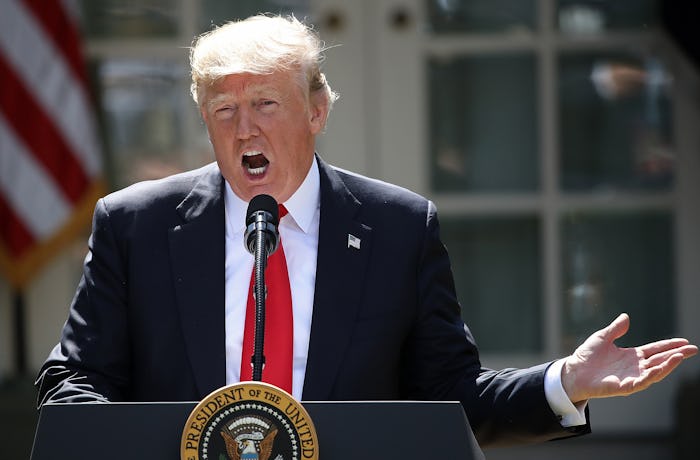News

How Trump's “Travel Ban” Tweets Could Hurt SCOTUS Case
Immediately in the wake of Saturday's terror attacks in London, President Donald Trump tweeted the need to be "vigilant" and "tough," calling on the courts to approve his travel ban. On Monday, Trump doubled down on his calls for the Supreme Court to expedite his travel ban in three separate tweets. Unfortunately for the White House administration, here's how Trump calling for a travel ban could undermine his SCOTUS petition — his controversial executive order that's currently tied up in two federal courts.
On Feb. 9, the Supreme Court struck down Trump's first travel ban, borne out of an executive order that restricted entry from seven majority-Muslim nations into the United States. A month later, Trump signed a second executive order — a revised temporary travel ban — limiting entry from now six majority-Muslim countries and a 10-day implementation delay. Injunctions against Trump's revised travel ban were put into effect by two courts: One in Maryland, the other in Hawaii. In May, the Maryland federal court upheld the travel ban injunction, which now leaves its fate up to the 9th District Court of Appeals, which will decide on the Hawaii ruling.
But when Trump went on a Twitter tirade Monday about his travel ban, he just gave Justice Department lawyers a massive headache as they try to make their case for Trump's travel order. Here's Trump's tweet about his travel ban from Saturday, which he tweeted before he ever offered any kind of support or sympathies to Londoners about the terrorist attack in London that has claimed at least seven lives. The White House hasn't responded to Romper's request for comment regarding whether the president accurately characterized the travel order.
Then, on Monday, in a rapid-fire flurry of tweets, Trump offered a series of followup thoughts.
As the Justice Department waits for the outcome of the Hawaii injunction against the travel order, currently being reviewed by the U.S. 9th Circuit Court of Appeals, one of the leading arguments against Trump's travel order is that it constitutes a ban against Muslims from entering the country — which would be unconstitutional. The Justice Department has insisted it is not a ban and is necessary for national security — but as Trump reiterated on Saturday and Monday, he has been explicit in naming his temporary travel order a travel ban — effectively undermining the Justice Department's case. Not only that, but Trump is making the case for his "original" travel ban — not the "watered down version" currently making its way through the courts.
In the 4th Circuit case, the judges ruled that Trump's own words about how he described his travel order on the campaign trail were binding on the intention of the order: The court agreed 10 to 3 that because Trump called it a "Muslim ban," the purpose of the order was to discriminate based on religion, and was thus unconstitutional. Trump has doubled down on officially calling it a travel ban now that he's president, and he's just made the work of government lawyers that much harder as the case works its way through the 9th Circuit, and possibly the Supreme Court.
Following the decision to uphold the travel ban injunction by the U.S. 4th Circuit Court of Appeals, Trump petitioned the Supreme Court to rule on his travel ban. According to New York Magazine, there are four possible ways SCOTUS could handle Trump's travel ban: They could do nothing at all, which isn't likely. They could also choose to hear the case, but then could either allow or overturn lower-court rulings to remain in effect while the case continues through the 9th Circuit. They could also rule to uphold the injunctions — thus lifting the travel ban — and force the White House administration to take a third stab at a travel order that could meet the Supreme Court's legal standards.
Until then, like so many other times Trump has taken to Twitter, he continues to tweet one thing while his administration says another — much to its very frustrated chagrin.